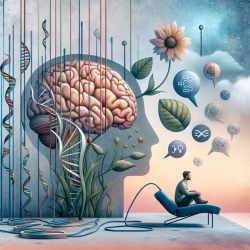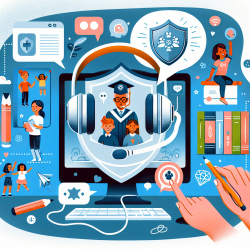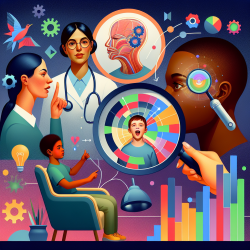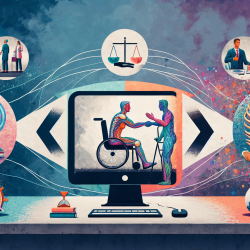Introduction
The recent research article, "Novel de novo variant in EBF3 is likely to impact DNA binding in a patient with a neurodevelopmental disorder and expanded phenotypes," has shed light on the intricate role of the EBF3 gene in neurodevelopmental disorders. This study provides critical insights that can help practitioners improve their therapeutic approaches for children with speech and developmental delays.
The EBF3 Gene and Its Significance
EBF3, a member of the Collier/Olf/EBF (COE) family of transcription factors, plays a pivotal role in neuronal development. Variants in this gene have been linked to a novel neurodevelopmental disorder characterized by intellectual disability, speech delay, and other phenotypic anomalies. This study focuses on a de novo missense variant in EBF3 (c.487C>T, p.(Arg163Trp)) that affects the DNA binding domain, leading to decreased DNA affinity and subsequent developmental issues.
Key Findings and Implications for Practitioners
The study utilized in silico modeling and molecular dynamics simulations to demonstrate the impact of the p.(Arg163Trp) variant on DNA binding. These findings align with previous research on EBF1, highlighting the critical role of the zinc knuckle motif in DNA interaction. Practitioners can leverage this knowledge to tailor their therapeutic strategies, focusing on the specific genetic underpinnings of a child's developmental challenges.
Practical Applications in Therapy
Understanding the genetic basis of neurodevelopmental disorders can enhance the effectiveness of therapy. Here are some ways practitioners can apply these findings:
- Customized Therapy Plans: By identifying specific genetic variants, therapists can develop personalized intervention strategies that address the unique needs of each child.
- Early Intervention: Recognizing the signs of EBF3-related disorders early can lead to more timely and effective interventions, potentially mitigating the impact of developmental delays.
- Collaborative Approach: Working closely with geneticists and other healthcare professionals can provide a comprehensive understanding of a child's condition, leading to more holistic care.
Encouraging Further Research
While this study provides valuable insights, it also highlights the need for further research into the EBF3 gene and its role in neurodevelopmental disorders. Practitioners are encouraged to stay informed about ongoing research and consider participating in studies that explore the genetic factors influencing child development.
Conclusion
The findings from this research underscore the importance of integrating genetic insights into therapeutic practices for children with developmental disorders. By understanding the genetic factors at play, practitioners can enhance their interventions, ultimately leading to better outcomes for children.
To read the original research paper, please follow this link: Novel de novo variant in EBF3 is likely to impact DNA binding in a patient with a neurodevelopmental disorder and expanded phenotypes: patient report, in silico functional assessment, and review of published cases.










